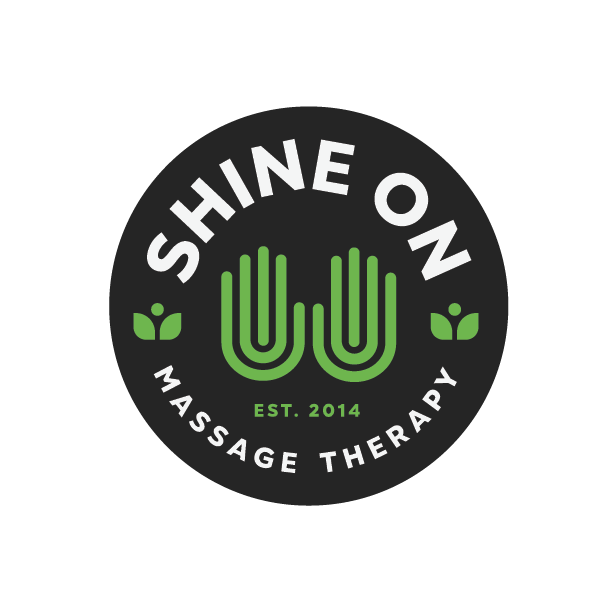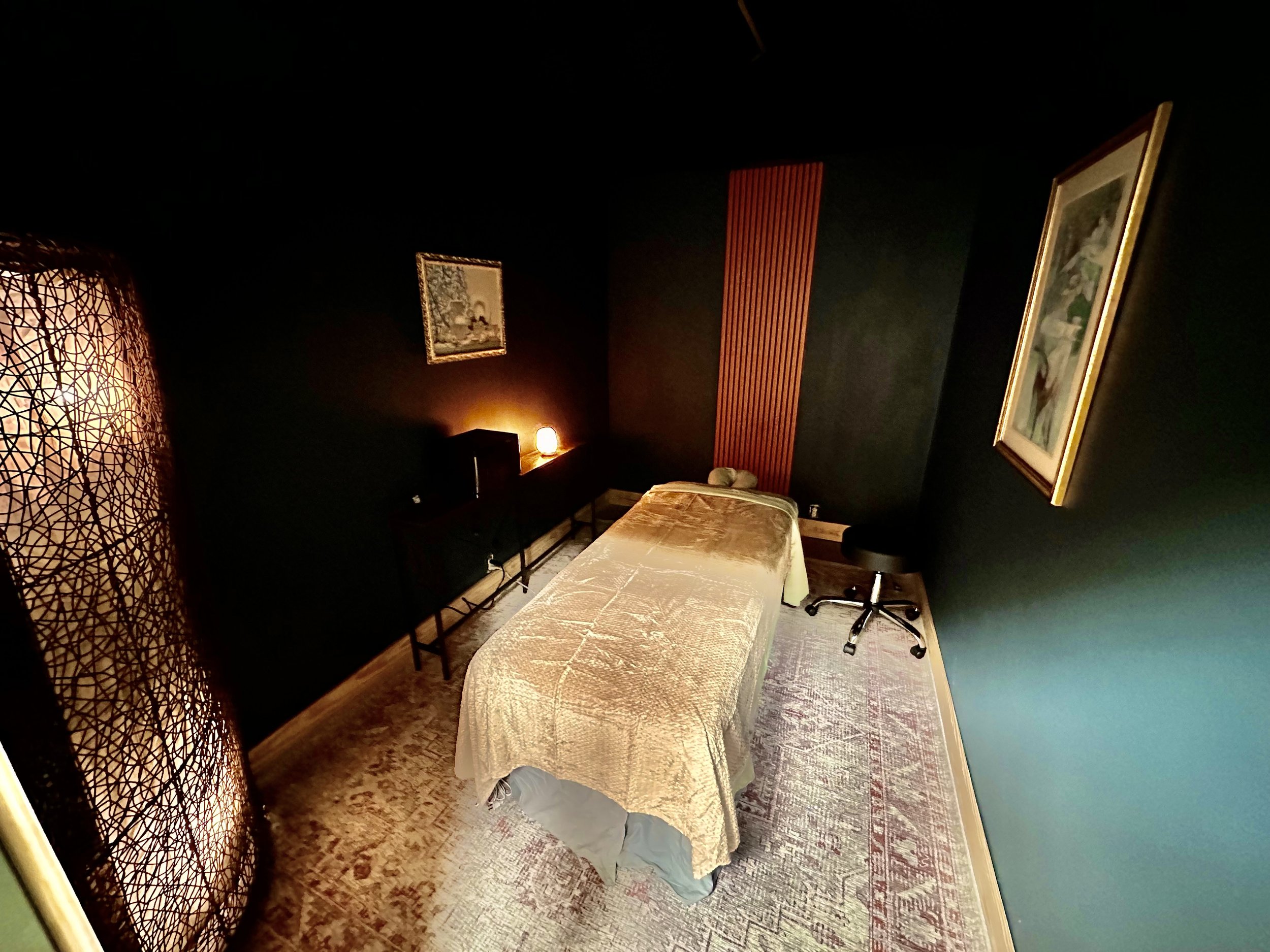
SHINING ON
The Power of Aromatherapy Naps: Recharge After Your Massage
Why Add an Aromatherapy Nap to Your Massage?
Think of it as the finishing touch. Your massage relaxes your muscles and releases tension, and the nap gives your body and mind the chance to integrate those benefits. With aromatherapy woven in, you’ll leave not only more relaxed, but also recharged, balanced, and ready to take on the rest of your day.
Popular Essential Oils We Use
Lavender – Melt away stress and drift into a calmer state of mind. Lavender helps you feel peaceful, balanced, and ready for deep rest.
Eucalyptus – Breathe easier and feel refreshed. Its crisp scent clears the head, awakens the senses, and leaves you energized.
Peppermint – A cool, uplifting boost for body and mind. Peppermint sharpens focus, eases tension, and gives you a refreshing lift.
What Is Aromatherapy?
Aromatherapy is the practice of using natural plant extracts—known as essential oils—to support overall well-being. Essential oils are highly concentrated compounds distilled from flowers, leaves, bark, or roots. For centuries, they’ve been used to promote relaxation, boost energy, ease stress, and even support better sleep.
When you breathe in an essential oil, the aroma connects directly with the part of your brain that influences feelings, memories, and mood. That’s why just the right scent can instantly bring a sense of calm or give you a refreshing lift.
Add it to your massage today for just $10!
If you’d like bring your own oils to add!
Our new Sunlighten Amplify III Sauna and Cold Plunge Tub!
We have recently upgraded to a Sunlighten Amplify III Far Infrared Sauna and instead of having the two tubs, we have upgraded to one, LARGE MODTUB! The cold plunge maintains a temperature of 47 degrees and the Sauna can get as hot as 170 degrees! Come check out Wilmington’s Hottest new experience!
Now offering couples massages at our Cargo District Location!
We are thrilled to announce that we are officially offering Couples Massages at our Cargo District Location!
All of the great experiences you loved about our downtown location but with AMPLE and FREE parking and no elevators!
Thank you for voting us Best of Wilmington!
Thank you for voting us Wilmington’s Best Massage! We will continue proving to you everyday, why you chose Shine On!
Benefits of Cold Plunge. Written by Maya Shetty, BS
Can Cold Water Plunges Improve Mental Health?
While the idea of diving into extremely cold water seems unappealing to most, recent studies have shown that CWI offers emotional benefits. In 2021, researchers recruited undergraduate students to take a 20-minute dip in chilly sea water (13.6°C, 56.5°F) and report their emotions before and after using a Profile of Mood States questionnaire. Compared to controls, the students who engaged in CWI experienced a shift in mood, noting a significant decrease in negative emotions like tension, anger, depression, fatigue, and confusion. Moreover, they experienced boosts in positive emotions such as vigor and self-esteem. Further research involving thirty-three adults new to cold-water swimming highlighted similar benefits. After immersing in a cold bath (20°C, 68°F) for just five minutes, participants reported feeling more active, alert, attentive, proud, and inspired.
These studies, which utilize self-reported questionnaires, indicate that cold-water immersion may significantly enhance mood and overall psychological well-being. It appears to activate traits associated with increased motivation and vitality, while simultaneously diminishing feelings of distress and nervousness.
How to Lower Cortisol Levels Naturally
CWI presents a unique stimulus for the body, prompting significant shifts in its hormonal stress response, particularly involving cortisol, a key regulator of stress. Unlike other stress hormones such as noradrenaline, cortisol levels remain relatively unchanged during the initial shock of cold water. Research highlights an intriguing aspect of cortisol dynamics: while levels do not significantly change during CWI, they significantly decrease afterward.
For example, a study concluded that a one-hour CWI session, whether in thermoneutral (32°C, 90°F), cooler (20°C, 68°F), or cold (14°C, 57°F) water, did not lead to an increase in blood cortisol concentrations. Instead, cortisol levels tended to decrease across all temperatures tested and remained below initial levels an hour after immersion. These findings suggest that cortisol production is not significantly activated by CWI, contrary to what might be expected under typical stress conditions. In fact, CWI may have potent stress-modulating effects. Further research indicates that cortisol levels remain considerably lower for up to three hours after just 15 minutes of CWI (10°C, 50°F). This pattern of response reveals a sophisticated regulatory mechanism, suggesting that CWI can effectively diminish feelings of stress following a session.
CWI may have the potential to modify our body’s stress response to stressors in everyday life. In a study where participants engaged in winter swimming (water 0-2°C, 32-36°F) for twenty seconds or cryotherapy (-110°C, -166°F) for two minutes, three times a week for twelve weeks, the body adapted remarkably. After just four weeks, participants showed significantly lower cortisol levels post-exposure, with levels continuing to drop in the following weeks. This adaptation contrasted with the noradrenaline response, which remained consistent even as the body became accustomed to the cold stress. This reduced cortisol response not only diminished the stress perceived from cold but also potentially enhanced the body’s capacity to manage other stressors more effectively.
The main take away from this study is that by reducing cortisol production in response to repeated cold exposure, participants might also release less cortisol in response to other stressors in everyday life, thus fostering a more resilient physiological state over time.
“Resilience is the ability to adapt to life’s stressors and adversities,” says Dr. Chawla. “The body and mind are interconnected, therefore greater physiological resilience may lead to greater psychological resilience as well.”
How Cold Water Immersion Impacts the Brain
CWI has been scientifically observed to influence brain function, affecting mood, stress response, and potentially brain health through several mechanisms. The immediate physiological response triggered by CWI is largely due to the dramatic change in temperature. A dense concentration of cold receptors in the skin detects this change, leading to a surge of electrical impulses from peripheral nerve endings to the brain. This intense stimulation activates various neural pathways, initiating a cascade of chemical responses designed to help the body manage and adapt to the stressor.
During the initial shock of CWI, the body experiences stress and discomfort due to the sudden drop in temperature. To counteract this, endorphins, the body’s natural pain relievers, are released. These endorphins not only reduce pain but also enhance feelings of well-being, akin to the “runner’s high” that often occurs in other physically demanding or stressful situations.
CWI also activates the sympathetic nervous system (SNS), which controls our “fight-or-flight” responses. This activation leads to a significant increase in noradrenaline (also known as norepinephrine), an excitatory neurotransmitter that not only helps manage stress but also boosts energy and focus. The surge in noradrenaline increases blood flow to the brain, potentially causing feelings of euphoria.
These two neurotransmitters play complementary roles. While norepinephrine prepares the body to handle acute stress by enhancing alertness and readiness, endorphins work to soothe pain and promote a positive mood. This dual response helps individuals cope with the immediate impacts of cold exposure more comfortably and can make the experience of cold water immersion more tolerable–and potentially even rewarding.
Regarding whether CWI has long-term positive effects on the brain, research indicates inconsistent results with respect to the increase of endorphin levels. It is possible that not everyone experiences this endorphin response to CWI, and among those who do, the effect may diminish over time, as the body becomes accustomed to the cold exposure. On the contrary, the increase in noradrenaline continues with each session of CWI, even after the body has adapted after months of regular practice.
These findings underscore the potential of CWI to be used as a reliable tool for improving energy, focus, and mood. These findings also point to the potential of CWI to be used in the treatment of neurological conditions that involve low noradrenaline, including anxiety and depression. However, more research is needed to understand if CWI has long-term effects on emotional well-being outside the water.
Also, CWI may improve brain function through the release of cold-shock proteins, which are produced by the body in response to cold conditions. Animal studies reveal that proteins like RNA binding protein (RBM3) play a crucial role in repairing and regenerating nerve cell connections after they’ve been exposed to cold. Additionally, studies have demonstrated that over-expressing RBM3 can help prevent neuronal connection loss in mice with neurodegenerative diseases. Although there is limited evidence in humans, these findings in mice suggest that regular CWI could potentially boost the expression of such beneficial proteins in humans, offering protection against or slowing the progression of neurodegenerative diseases by preserving and reinforcing neural connections.
Reaction to Cold Water: Full-Body vs. Facial Immersion
Physiological responses to CWI differ significantly based on whether the exposure is to the full body or just the face. Full-body immersion exposes a significant surface area to cold, inducing thermal stress that can substantially lower skin and core body temperatures. This extensive exposure activates the sympathetic nervous system, which in turn triggers a release of neurotransmitters and hormones that drive the stress response. Consequently, this leads to vasoconstriction, an increased heart rate, and a heightened metabolic rate, all of which help preserve body heat and maintain core temperature.
In contrast, immersing just the face in cold water activates parasympathetic activity, which is responsible for “rest and digest” functions in the body. This effect is likely due to the mammalian diving reflex—an evolutionary adaptation that optimizes respiration and conserves oxygen by preferentially directing oxygen to vital organs. The diving reflex is mediated by the vagus nerve, which activates the parasympathetic system and releases a sense of calm. The trigeminal nerve in the face also plays a crucial role when stimulated by cold, sending signals that further enhance parasympathetic output, decreasing heart rate, and boosting digestive activity.
These differences highlight how CWI can be strategically used to target specific physiological responses and therapeutic outcomes, depending on whether the exposure is localized to the face or involves the entire body.
“I sometimes recommend facial cold water immersion to my patients as part of the T in TIPP skills to help people with emotion regulation. TIPP stands for temperature, intense exercise, progressive muscle relaxation, and paced breathing,” says Dr. Chawla. “These skills involve changing your body chemistry to shift emotions. Some people find brief facial immersion in cold water or taking a cold shower to be helpful in shifting their body chemistry and thereby shifting their emotional state.”
Now offering Sauna and Cold Plunge!
The detox den
Our newest feature at our cargo district location includes a 3 person infrared Sauna and a LARGE Cold Plunge Tub.
Sure, you can pay for a gym membership just to use their overcrowded sauna and sit with a large group of sweaty naked people, OR you can enjoy the luxurious and private Detox Den at Shine On Massage in the Cargo District all to yourself!
Sauna packages and online booking available now and monthly unlimited Sauna Memberships coming soon!
New Location now Open in the Cargo District!
We have some exciting news!
We have officially opened our second location in the East Cargo District at 1948 Moss Street!
Tucked away beside a beautiful outdoor garden shop and right behind Mess Hall lies your new neighborhood massage studio. Mention this blog and receive $10 off your first booking!
We offer Lymphatic Drainage Massage packages!
LYMPHATIC DRAINAGE IS A GENTLE MASSAGE THAT USES VERY LIGHT PRESSURE AND LIGHT RHYTHMIC STROKES TO STIMULATE THE LYMPHATIC SYSTEM TO REMOVE WASTE AND TOXINS FROM THE TISSUES. A LYMPHATIC MASSAGE CAN HELP TO DECREASE FATIGUE, SWELLING, AND PAIN AS IT SUPPORTS THE BODY’S NATURAL IMMUNE SYSTEM. ASK US ABOUT OUR POST-OP PACKAGES!
Meet Our Newest Deep Tissue Therapist, Lukas!
Lukas grew up in Jersey teaching swim lessons. During that time he fell in love with biomechanics and teaching people how to move fluidly, in fluid. When he moved to North Carolina he began teaching pool aerobics as a way to further that aim. Later on he began training Muay Thai, learning more about the connection between mind and body as a means to express himself. Eventually hard training led to back and neck injuries that were devastating. That's when a Massage Therapist changed his life. After his first session he felt completely new. The next day he decided he wanted to be a Massage Therapist to help people reclaim agency over their bodies. His goal is to provide the best treatment possible to people so they can do the things they love in life, pain free.























